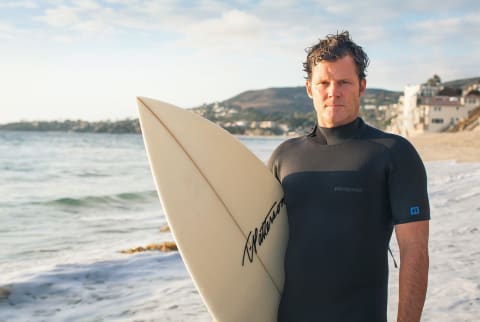Advertisement
Is Surfing The New Yoga? 5 Reasons Catching Waves Feeds The Mind, Body & Soul


When asked to picture the most mindful exercise, surfing might not immediately come to mind. But after much thought, we find it's the epitome of mindfulness itself; similar to yoga, surfing takes strength, skill, and self-reflection (plus a host of community-oriented and sustainability benefits, to boot).
Sure, it's not as easy to replicate in the comfort of your kitchen like an at-home yoga flow, but that doesn't mean we shouldn't see the value surfing has to offer. As CEO of Surfrider Chad Nelsen, Ph.D., tells me on the mindbodygreen podcast, "surfing has values that have previously been ignored." That said, it's time we give the sport the recognition it deserves.
If you're looking for a well-rounded form of exercise, you might want to keep surfing on your radar. Ahead, five reasons surfing feeds your mind, body, and soul (and more):
It's one of the most difficult sports.
Think about it: Balancing on a surfboard takes some pretty impressive core strength (it's no wonder landlocked boards have made their way to a few surf-inspired workout classes). "It's like learning to ski, but the mountain under you is moving the whole time," Nelsen says. "It's super challenging; it's all about timing and getting into rhythm with the ocean."
Balance, rhythm, and strength—needless to say, surfing takes some skill. So much so, it's even a brand-new addition to the Olympic Games: The International Olympic Committee officially recognized surfing as an Olympic sport in 2016, with its debut in the (now postponed) 2020 Tokyo Olympics.
It allows you to connect with nature.
Of course, there's the obvious: You're quite literally in the ocean as you surf. But don't forget about the wildlife you share the water with. "You can see fish, dolphins, sea lions—you're communicating with nature in a really special way," Nelsen explains. The best part? You're doing so in a way that doesn't interfere with the ecosystem, even helping to protect it (more on that later).
It's meditative.
"It has that meditative effect of being in the moment," Nelsen remarks. Of course, if you're a beginner, your thoughts most likely focus on how to maintain balance and avoid a face full of seawater. But once you're able to catch a wave, you'll be able to clear your mind and trust your body's natural instincts. Better yet, you'll become tuned into the natural movement of the wave: "Once you're surfing, you're moving, adapting, and flowing with the energy around you," Nelsen says. Pretty mindful, if you ask us.
On a similar note, simply being out in the ocean can help you self-reflect and realize just how small you really are (just like how meditation can help you grasp the bigger picture of whatever is going on in your life). "The ocean is really big and powerful," Nelsen adds. It allows you to zoom out, clear your head, and live in the moment as you catch waves.
It enhances sustainability initiatives.
It might sound obvious, but here's the thing: Surfers need the ocean to, you know, surf. And if there are enough people interested in catching waves, there will be enough demand to keep those—shall we say—arenas up to par. (Remember: The power is ultimately in the hands of the consumer.) In other words, surfers don't want to be surfing on polluted, plastic-ridden oceans. As more and more people become interested in the sport, more (and stricter) clean water restrictions may follow suit.
It fosters community.
Like any sport, surfing garners a community of passionate, valuable players. Just as you may share the same values as your fellow yogis, surfers follow that same beat. Even more so, localized areas may contain unique surf communities; after all, "the rural coast of Oregon is different from the urban coast of Miami," Nelsen informs. With different coasts come different surf communities and cultures. And who knows? Perhaps you'll join the fight to demand climate change legislation altogether. "The issues are serious, but we can have fun doing it together," Nelsen adds.
Needless to say, surfing is a completely free resource with a host of benefits—physical, mental, and social. "All we have to do to keep it going is preserve the spot—[the ocean's] doing the work for us," Nelson adds. So let's keep surfing front of mind; if you don't live near the water, you may not have the luxury to surf at the moment, given the pandemic and all, but that doesn't mean you can't see the sport's value in the meantime. Better yet, you can do your part to save our oceans so that they're looking healthy and blue the next time we're able to travel and catch waves. Surfers like Nelsen will surely thank you.
Enjoy this episode, sponsored by Cotton! And don't forget to subscribe to our podcast on iTunes, Google Podcasts, or Spotify!